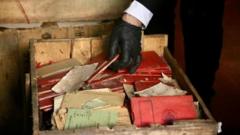The recent discovery of crates housing distressing documents from Nazi Germany has emerged from the depths of Argentina's Supreme Court. The find occurred while workers were undertaking the task of clearing out the basement in preparation for relocating archives to an upcoming museum. The documents are traced back to an unusual event on June 20, 1941, when 83 diplomatic pouches arrived from the German embassy in Tokyo via Japanese steamship.
The curious workers stumbled upon several wooden champagne crates, which upon inspection, revealed material aimed at promoting Adolf Hitler's ideology in Argentina during World War II. The Argentine customs had initially seized these pouches after they discovered Nazi propaganda material hidden within. This action was raised to alert the Argentine authorities, who feared the contents could jeopardize the nation's neutrality during the global conflict.
Once the finds were brought to light, the Argentine Supreme Court took immediate action. They promptly secured the crates and reached out to the Buenos Aires Holocaust Museum for assistance in inventorying the documents. Initial evaluations by historians and experts suggested that the crates contained a wealth of information ranging from black-and-white photographs to membership documents adorned with swastikas.
Additionally, these documents could potentially illuminate the complex financial networks and international ties held by the Nazi regime. The history surrounding these pouches indicates that their return to the German Embassy was requested by its officials, yet an Argentine judge ordered them to be retained, leaving them untouched for decades until this recent discovery.
Argentina, particularly under the regime of Juan Perón after World War II, notably became a safe haven for numerous high-profile Nazi officials, including infamous figures like Adolf Eichmann and Josef Mengele. This historical context amplifies the importance of the rediscovered documents, as Argentina's past complicity in harboring Nazi war criminals continues to provoke extensive scrutiny and reflection. In 2000, a formal apology for the country's role during this period was issued by President Fernando de la Rúa, recognizing the troubling legacy of those years.
The curious workers stumbled upon several wooden champagne crates, which upon inspection, revealed material aimed at promoting Adolf Hitler's ideology in Argentina during World War II. The Argentine customs had initially seized these pouches after they discovered Nazi propaganda material hidden within. This action was raised to alert the Argentine authorities, who feared the contents could jeopardize the nation's neutrality during the global conflict.
Once the finds were brought to light, the Argentine Supreme Court took immediate action. They promptly secured the crates and reached out to the Buenos Aires Holocaust Museum for assistance in inventorying the documents. Initial evaluations by historians and experts suggested that the crates contained a wealth of information ranging from black-and-white photographs to membership documents adorned with swastikas.
Additionally, these documents could potentially illuminate the complex financial networks and international ties held by the Nazi regime. The history surrounding these pouches indicates that their return to the German Embassy was requested by its officials, yet an Argentine judge ordered them to be retained, leaving them untouched for decades until this recent discovery.
Argentina, particularly under the regime of Juan Perón after World War II, notably became a safe haven for numerous high-profile Nazi officials, including infamous figures like Adolf Eichmann and Josef Mengele. This historical context amplifies the importance of the rediscovered documents, as Argentina's past complicity in harboring Nazi war criminals continues to provoke extensive scrutiny and reflection. In 2000, a formal apology for the country's role during this period was issued by President Fernando de la Rúa, recognizing the troubling legacy of those years.


















